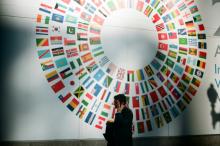Water for Sustainable Development (WSD) is a multi-disciplinary policy research and capacity development project that aims to stimulate sustainable development in the Asia region. The project will investigate the role of water in the society, economy and natural environment, and scientifically demonstrate how the achievement of the United Nations Sustainable Development Goals (SDGs), especially Goal 6, will contribute to the development of the region.
Rural areas in Asia often find their economic activity tied to water environment, especially where agriculture, industries, or services linked to nature/historical landscapes are the main source of income. The interdependence between human livelihood and nature means that any change in quality, quantity and movement of water has social, economic, and environmental consequences. The centrality of water, its role, and impact is such that the SDGs place the conservation of the water environment at the heart of Goal 6.
Proper understanding of the role of water is essential for sustainable development in rural areas, and it requires an interdisciplinary research that spans multiple areas of expertise. Building on UNU-IAS experience in cross-sectoral water-related policy research, WSD is focused on attaining the following objectives:
- Establish a framework to comprehensively evaluate the role of water in selected locations in Asia,
- Develop methodologies to identify future scenarios to realise the water environment envisaged in SDGs, factoring in the specific characteristics of each target area, and
- Provide tools and policy options related to the conservation of water environments, which will bring about sustainable development in the region.
WSD will expand upon the knowledge and networks of its precursor, the Water and Urban Initiative (2014-2017), which contributed to improving the Asian urban water environment.
- Project Manager
- Dr. Kensuke Fukushi

